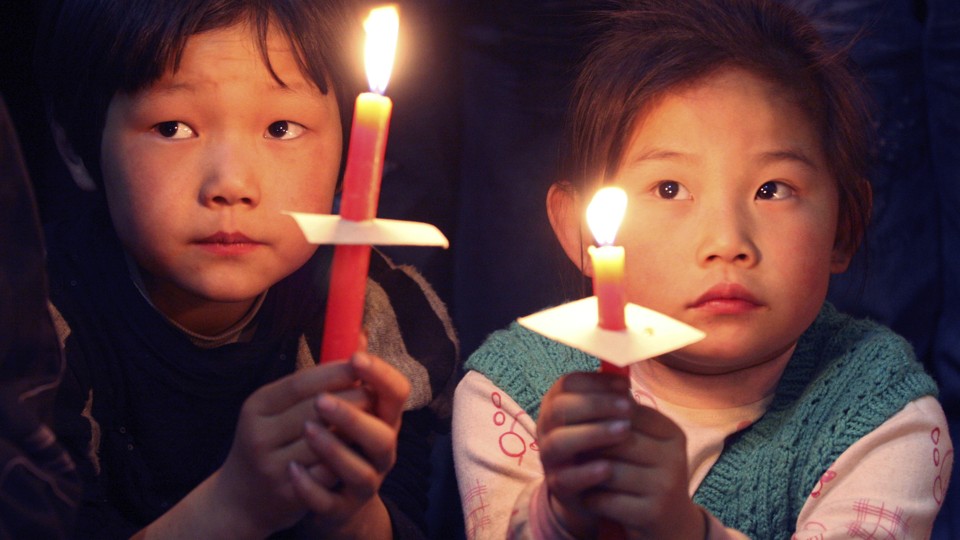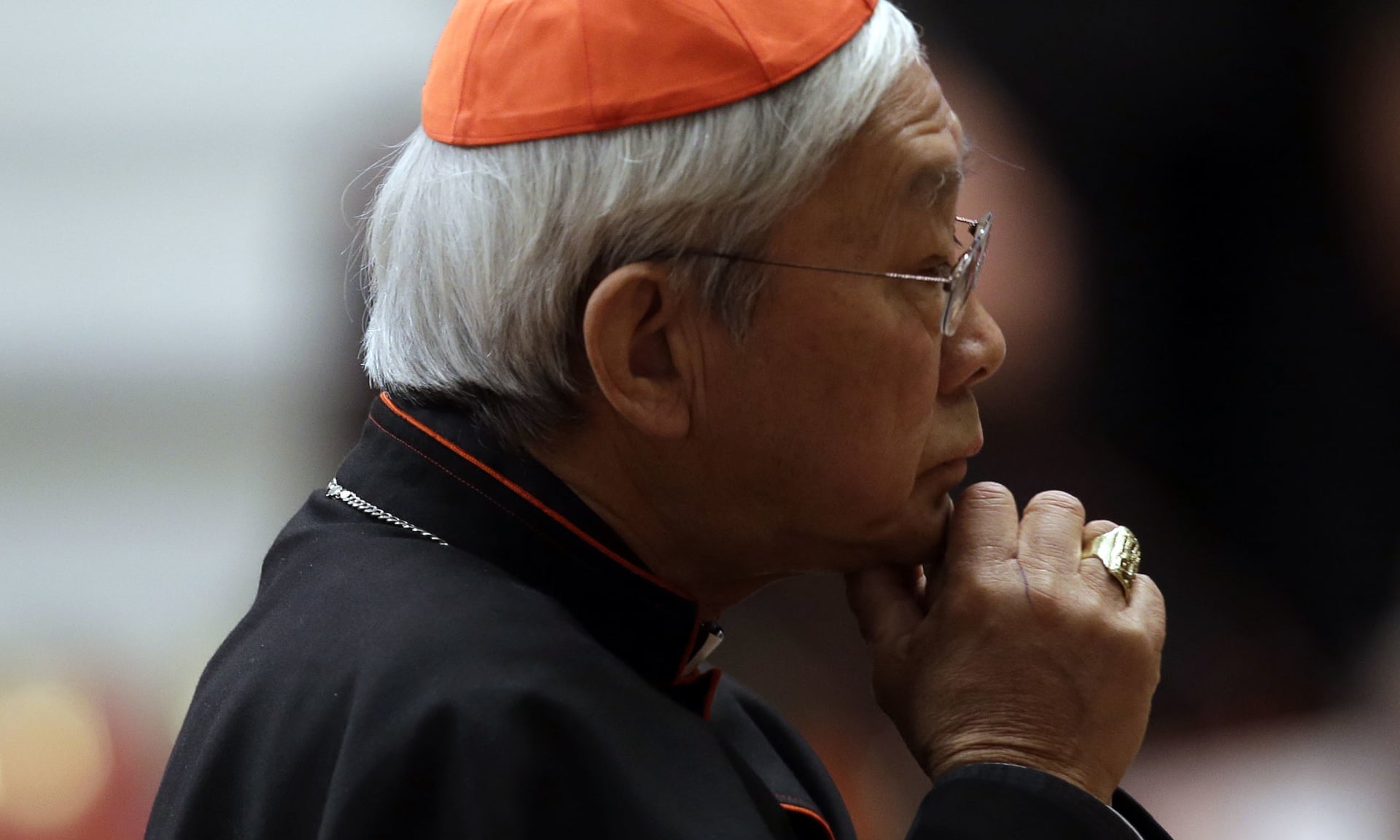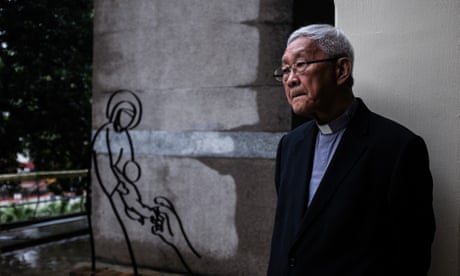By BETHANY ALLEN-EBRAHIMIAN
 Children hold candles during the Easter mass at a church in Xiaohan village of Tianjin municipality in 2009.
Children hold candles during the Easter mass at a church in Xiaohan village of Tianjin municipality in 2009.The Chinese government detained a beloved Catholic bishop earlier this week in an apparent attempt to keep him out of sight around the Easter holidays, just as an end to a decades-long split between Beijing and the Vatican may be in sight.
The bishop, Guo Xijin, is recognized by the Vatican but not by the official Catholic Church in China, which is under government control.
Such underground bishops are at the heart of the split.
Since the 1950s, the Chinese government has insisted it must approve the selection of bishops, but the Vatican has continued to ordain clergy in secret, leading to overlapping sets of official and underground bishops in some Chinese parishes.
Guo was detained in the days leading up to the Easter holidays after refusing to hold services alongside a government-approved bishop.
Guo was detained in the days leading up to the Easter holidays after refusing to hold services alongside a government-approved bishop.
The Vatican had asked the 59-year-old bishop to step down as a concession to Beijing.
Negotiations between Beijing and the Holy See to end the dueling bishoprics and unify the Church are now underway, and a deal is expected as early as Easter weekend.
But Guo’s detention is indicative of exactly what kind of solution the Chinese Communist Party has in mind.
Most likely, it will not be a gentle rapprochement with the Vatican so much as a heavy-handed crackdown on the underground church, with the government attempting to neutralize it once and for all.
For decades, the Communist party-state has tolerated the existence of a parallel system of official churches organized under government auspices, and unofficial, or “underground,” churches that operate without government oversight.
For decades, the Communist party-state has tolerated the existence of a parallel system of official churches organized under government auspices, and unofficial, or “underground,” churches that operate without government oversight.
(This is true of both Protestant and Catholic Churches in China. While the Vatican deal will only affect underground Catholic bishops, legal and bureaucratic changes are likely to pressure both Protestant and Catholic underground churches.)
A series of recent moves indicates that the party is now rejecting the status quo, and is seeking to extend its control over these formerly independent congregations.
New legislation took effect on February 1, tightening government regulation of religion and placing more explicit restrictions on unofficial religious activity.
New legislation took effect on February 1, tightening government regulation of religion and placing more explicit restrictions on unofficial religious activity.
A leaked directive dated March 16 ordered local government agencies to begin investigating all underground Christian activity in Beijing, which suggests a coming crackdown on that activity, as other sectors of Chinese society have experienced in recent years.
Most telling, however, is the government reorganization announced last week that delegated religious affairs, previously under the auspices of the religious affairs bureau, a government office, to the United Front Work Department, a Communist Party organ under the direct control of the party’s Central Committee.
“The party is in some ways distrustful of the religious affairs bureau for fear that some people in that agency may have the kind of training that makes them more open to or sympathetic with different religious groups,” said Xi Lian, a professor of world religion at Duke Divinity School.
Most telling, however, is the government reorganization announced last week that delegated religious affairs, previously under the auspices of the religious affairs bureau, a government office, to the United Front Work Department, a Communist Party organ under the direct control of the party’s Central Committee.
“The party is in some ways distrustful of the religious affairs bureau for fear that some people in that agency may have the kind of training that makes them more open to or sympathetic with different religious groups,” said Xi Lian, a professor of world religion at Duke Divinity School.
“But now the United Front is going to take over and impose the iron will of the party.”
China is governed by a dual, parallel structure of party and government bodies at every level, from the highest echelons of power down to the village committees.
Government bodies have tended to have relatively more transparency than party organs; the party is an information black hole.
And the United Front Work Department in particular is the primary means by which the party has extended and solidified its influence over every level of Chinese society.
There is little room for speculation about the implications of this move for the Catholic Church in China.
There is little room for speculation about the implications of this move for the Catholic Church in China.
It almost certainly means more direct party control and marginalization for anyone who doesn’t toe the party line.
“The point of having administrative control over religious groups in China is to ‘deconflict’ an organization from competing with the party,” said Peter Wood, an analyst at the datamining firm TextOre who researches the United Front.
“The point of having administrative control over religious groups in China is to ‘deconflict’ an organization from competing with the party,” said Peter Wood, an analyst at the datamining firm TextOre who researches the United Front.
“The point isn’t to provide services—it is control, redirection, and deconfliction.”
None of this bodes well for Chinese Christians, said Lian.
“It’s making a lot of Christians in China very nervous,” said Chloe Starr, a professor of Asian Christianity and theology at Yale Divinity School.
None of this bodes well for Chinese Christians, said Lian.
“It’s making a lot of Christians in China very nervous,” said Chloe Starr, a professor of Asian Christianity and theology at Yale Divinity School.
“A lot of rights lawyers had wanted a greater transfer to the judiciary, rather than state oversight, but we’ve moved in the opposite direction. This is taking it further away from judicial process and more directly under the party influence, which is worrying a lot of Christians.”
A move to co-opt or even disband the underground church would be well in line with Xi Jinping’s sweeping campaigns in the past few years to strangle dissent and consolidate party control over every aspect of Chinese society.
A move to co-opt or even disband the underground church would be well in line with Xi Jinping’s sweeping campaigns in the past few years to strangle dissent and consolidate party control over every aspect of Chinese society.
Xi has eliminated many of the gray areas that in the past allowed for a limited degree of expression. During his tenure, the party has created a comprehensive internet censorship regime, cracked down on human rights lawyers, implemented ideological controls in universities and private businesses, and constructed a high-tech surveillance state in the far-west region of East Turkestan.
The looming Vatican deal, then, comes at a time when Beijing is moving to exercise more control over religious affairs than it has in decades.
The looming Vatican deal, then, comes at a time when Beijing is moving to exercise more control over religious affairs than it has in decades.
One possible arrangement for such a deal, reportedly being discussed, would allow the party to select bishops but give the Vatican veto power over the final selection.
But such an admission of foreign control over domestic affairs—and particularly over religion, which the party has always viewed with special suspicion—would likely be anathema to the party given its current direction.
“Not only is the deal a terrible one, the Vatican has chosen the worst time to do it—at a time when Xi Jinping is becoming the new emperor, when the party is cracking down so harshly,” said Lian.
“Not only is the deal a terrible one, the Vatican has chosen the worst time to do it—at a time when Xi Jinping is becoming the new emperor, when the party is cracking down so harshly,” said Lian.
“I really have a hard time understanding why the Vatican still clings to this completely unrealistic hope of striking a deal that will the benefit the Church, and striking a deal that the Communist Party will honor.”
Lian raised the example of Hong Kong.
Lian raised the example of Hong Kong.
The agreement signed between Britain and China when the city was handed back to the mainland after 150 years of British colonial rule specified that Beijing must allow universal suffrage in Hong Kong by the year 2017.
But China has come to refer to that agreement as a historical document rather than a binding agreement, and it has refused to allow elections in Hong Kong without first vetting the candidates.
Similarly, it’s highly unlikely that the Communist Party will now give true veto power to the Vatican.
More likely, even if some kind of ceremonial veto power is given, all the candidates will be completely pre-vetted by Beijing.
There is little reason to think that the party would honor any concessions to the Vatican, said Lian.
The case of Guo Xijin is likely a taste of what any supposed deal will look like on the ground—arrests, detentions, and forced adherence to Beijing’s line.
The case of Guo Xijin is likely a taste of what any supposed deal will look like on the ground—arrests, detentions, and forced adherence to Beijing’s line.
Going forward, Chinese Catholics can expect more of this, not less.

